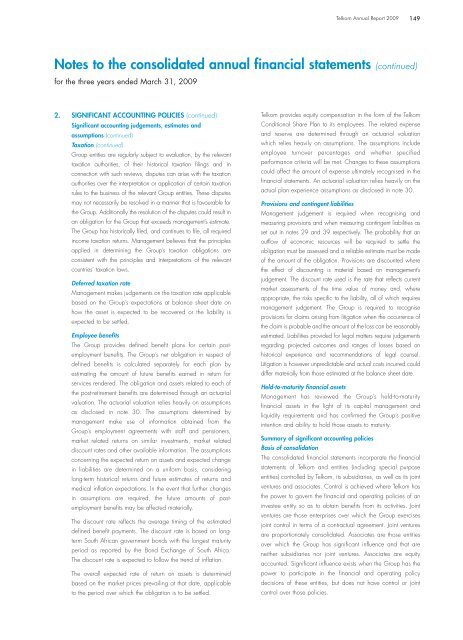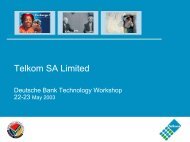Telkom AR front.qxp
Telkom AR front.qxp
Telkom AR front.qxp
You also want an ePaper? Increase the reach of your titles
YUMPU automatically turns print PDFs into web optimized ePapers that Google loves.
2. SIGNIFICANT ACCOUNTING POLICIES (continued)<br />
Significant accounting judgements, estimates and<br />
assumptions (continued)<br />
Taxation (continued)<br />
Group entities are regularly subject to evaluation, by the relevant<br />
taxation authorities, of their historical taxation filings and in<br />
connection with such reviews, disputes can arise with the taxation<br />
authorities over the interpretation or application of certain taxation<br />
rules to the business of the relevant Group entities. These disputes<br />
may not necessarily be resolved in a manner that is favourable for<br />
the Group. Additionally the resolution of the disputes could result in<br />
an obligation for the Group that exceeds management’s estimate.<br />
The Group has historically filed, and continues to file, all required<br />
income taxation returns. Management believes that the principles<br />
applied in determining the Group’s taxation obligations are<br />
consistent with the principles and interpretations of the relevant<br />
countries’ taxation laws.<br />
Deferred taxation rate<br />
Management makes judgements on the taxation rate applicable<br />
based on the Group’s expectations at balance sheet date on<br />
how the asset is expected to be recovered or the liability is<br />
expected to be settled.<br />
Employee benefits<br />
The Group provides defined benefit plans for certain postemployment<br />
benefits. The Group’s net obligation in respect of<br />
defined benefits is calculated separately for each plan by<br />
estimating the amount of future benefits earned in return for<br />
services rendered. The obligation and assets related to each of<br />
the post-retirement benefits are determined through an actuarial<br />
valuation. The actuarial valuation relies heavily on assumptions<br />
as disclosed in note 30. The assumptions determined by<br />
management make use of information obtained from the<br />
Group’s employment agreements with staff and pensioners,<br />
market related returns on similar investments, market related<br />
discount rates and other available information. The assumptions<br />
concerning the expected return on assets and expected change<br />
in liabilities are determined on a uniform basis, considering<br />
long-term historical returns and future estimates of returns and<br />
medical inflation expectations. In the event that further changes<br />
in assumptions are required, the future amounts of postemployment<br />
benefits may be affected materially.<br />
The discount rate reflects the average timing of the estimated<br />
defined benefit payments. The discount rate is based on longterm<br />
South African government bonds with the longest maturity<br />
period as reported by the Bond Exchange of South Africa.<br />
The discount rate is expected to follow the trend of inflation.<br />
The overall expected rate of return on assets is determined<br />
based on the market prices prevailing at that date, applicable<br />
to the period over which the obligation is to be settled.<br />
<strong>Telkom</strong> Annual Report 2009 149<br />
Notes to the consolidated annual financial statements (continued)<br />
for the three years ended March 31, 2009<br />
<strong>Telkom</strong> provides equity compensation in the form of the <strong>Telkom</strong><br />
Conditional Share Plan to its employees. The related expense<br />
and reserve are determined through an actuarial valuation<br />
which relies heavily on assumptions. The assumptions include<br />
employee turnover percentages and whether specified<br />
performance criteria will be met. Changes to these assumptions<br />
could affect the amount of expense ultimately recognised in the<br />
financial statements. An actuarial valuation relies heavily on the<br />
actual plan experience assumptions as disclosed in note 30.<br />
Provisions and contingent liabilities<br />
Management judgement is required when recognising and<br />
measuring provisions and when measuring contingent liabilities as<br />
set out in notes 29 and 39 respectively. The probability that an<br />
outflow of economic resources will be required to settle the<br />
obligation must be assessed and a reliable estimate must be made<br />
of the amount of the obligation. Provisions are discounted where<br />
the effect of discounting is material based on management’s<br />
judgement. The discount rate used is the rate that reflects current<br />
market assessments of the time value of money and, where<br />
appropriate, the risks specific to the liability, all of which requires<br />
management judgement. The Group is required to recognise<br />
provisions for claims arising from litigation when the occurrence of<br />
the claim is probable and the amount of the loss can be reasonably<br />
estimated. Liabilities provided for legal matters require judgements<br />
regarding projected outcomes and ranges of losses based on<br />
historical experience and recommendations of legal counsel.<br />
Litigation is however unpredictable and actual costs incurred could<br />
differ materially from those estimated at the balance sheet date.<br />
Held-to-maturity financial assets<br />
Management has reviewed the Group’s held-to-maturity<br />
financial assets in the light of its capital management and<br />
liquidity requirements and has confirmed the Group’s positive<br />
intention and ability to hold those assets to maturity.<br />
Summary of significant accounting policies<br />
Basis of consolidation<br />
The consolidated financial statements incorporate the financial<br />
statements of <strong>Telkom</strong> and entities (including special purpose<br />
entities) controlled by <strong>Telkom</strong>, its subsidiaries, as well as its joint<br />
ventures and associates. Control is achieved where <strong>Telkom</strong> has<br />
the power to govern the financial and operating policies of an<br />
investee entity so as to obtain benefits from its activities. Joint<br />
ventures are those enterprises over which the Group exercises<br />
joint control in terms of a contractual agreement. Joint ventures<br />
are proportionately consolidated. Associates are those entities<br />
over which the Group has significant influence and that are<br />
neither subsidiaries nor joint ventures. Associates are equity<br />
accounted. Significant influence exists when the Group has the<br />
power to participate in the financial and operating policy<br />
decisions of these entities, but does not have control or joint<br />
control over those policies.




